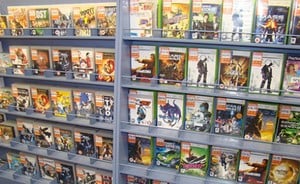
At least, that appears to be the mentality of some forum posters, unevenly illustrating their opinion in forums across the Internet.
The NPD group released sales figures for the North American market this week, ranking Resistance 3 in seventh position for the month of September. "Reasonable," I told myself after hurriedly perusing the top-ten for myself, before swiftly moving onto a news story I actually cared about.
But I couldn't escape the furore surrounding Resistance-gate. Apparently Insomniac's latest — and arguably greatest — didn't live up to expectations, selling just 180k copies at retail — a figure significantly lower than its heavily maligned predecessor.
The sales-age speculation was fierce, and at times unbearable. Follow the consensus of the most vocal opinions and you'll come to the conclusion that sales wholly define a platform, peripheral or video game's quality. You only need swagger into the 'Kinect vs PlayStation Move' discussion boards to be inundated with wording analysis and hastily contrived numbers.
Those figures — according to some — underline the quality of the products they pertain to. But its a mentality I heavily object. In my opinion, SEGA's ambitious open-world series, Shenmue, is one of the greatest video game franchises ever produced. But it bombed so hard at retail that I'm still patiently waiting for a conclusion to Ryo Hazuki's plight.
As with any commercial industry, developers and publishers rely on finances to fund their future products. And so I can understand gamers wanting to see the success of their favourite franchises. But the dependence on sales figures is getting out of hand — providing fuel for the console wars rather than reasonable discussion. And it's clouding what's important about video games in the first place: the experience.
I observed a Twitter exchange over the weekend, discussing the marketability of Ratchet & Clank: All 4 One. One Tweeter observed that he couldn't wait for the co-operative action-adventure title, but was concerned about its performance at retail. His Tweet was hastily responded to, with another Twitter user explaining that a lack of marketing was probably to blame. Both Tweeters seemed genuinely disgruntled — their anticipation of the game clearly affected by its potential sales ability. Both went on to discuss how they'd sampled the game at various events, thoroughly enjoyed it, but "not got around" to pre-ordering yet.
A similar discussion is taking place in various PlayStation Vita threads. Since Nintendo dropped the price-point of the 3DS and announced its grasp on the Monster Hunter series, perception of Sony's new handheld has changed. Dropped. Dwindled. It's almost like the device Sony unveiled at E3 earlier in the year has had its innards ripped out. And yet the only real thing that's changed is people's perceptions. Vita — which was an unparalleled contender to Nintendo's throne when both systems carried the same price-point — is suddenly too expensive and too poorly managed to be successful. The tone I've observed in multiple message boards is, bizarrely, one of discontent.
Maybe it's time we all started looking past the sales figures of our favourite hobby. Developers and publishers hire analysts and executives to deal with the raw numbers. As hobbyists and fans we need to shift our focus onto experiences and mechanics. Let's talk about games rather than numbers, and let's find enjoyment in products regardless of their commercial success.
As gamers we're trained to focus on numbers and competition. But retail is nothing like a high-score leaderboard, so let's stop treating it like one.
[ Pic ]
Its rumoured that Twiggy has spent the past several months touring with avant-garde dance troupe Cirque Du Soleil. The anonymous PushSquare columnist is still on the run from the British monarchy on account of treason. Twiggy was last sighted eating an Asda branded ham and cheese sandwich in Grimsby.
Comments 0
Wow, no comments yet... why not be the first?
Leave A Comment
Hold on there, you need to login to post a comment...